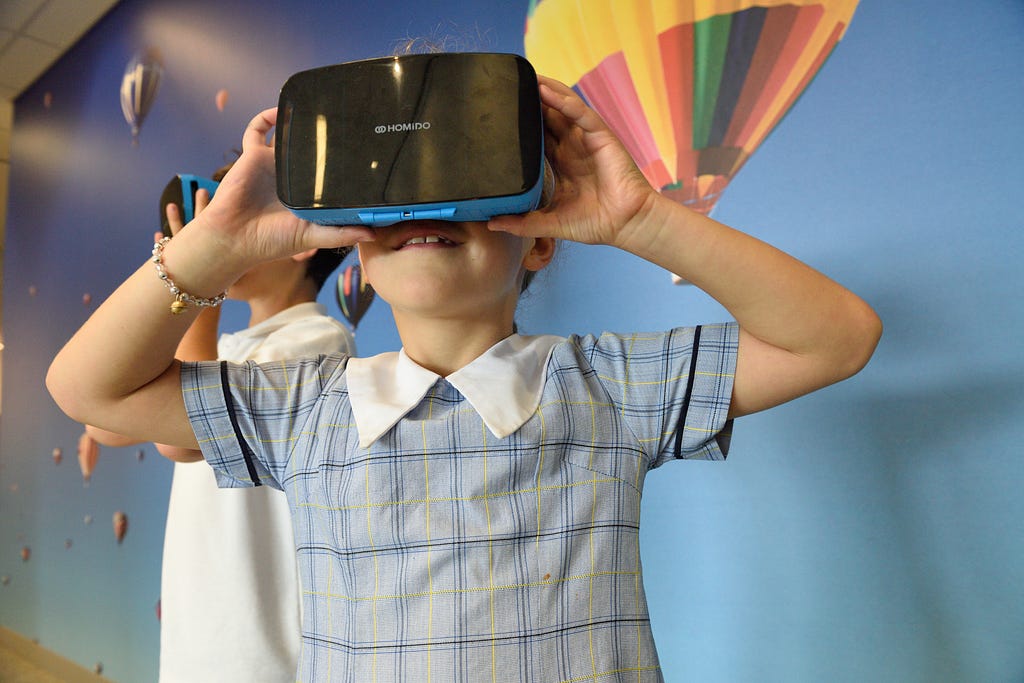By Melody Mao, MEng ’20 (EECS)

In the realm of VR, educational applications are the way forward
Though many may associate VR with immersively in-your-face gaming, it actually presents a broad medium for content rather than just a particular subcategory of gaming. VR spans categories as disparate as gaming, immersive entertainment, virtual art, extended-reality water recreation, and countless more virtual experiences. Meanwhile, just as a wide variety of apps are emerging across sectors of the VR market, a broad array of products are launching within the field of education. These products demonstrate different teaching methods and different degrees of integrating VR into the classroom. Some apps approach VR learning as a complete alternative to in-person teaching, such as Universe, which provides a platform for VR tutoring and virtual lessons. Other apps treat VR as a simulation environment to prepare students for real situations, like rumii (exploring a virtual archaeological site as a primer before visiting in person), or Labster (practicing lab procedures in a virtual simulation, sometimes more accessible than a real lab) (Gossett, 2019). Still others, like Lifeliqe, present VR as an aid to hands-on learning, in the form of 3D scientific models (Gossett, 2019). Finally, another class of applications leverage VR to offer virtual field trips, like the Jurassic journey I envisioned earlier; these include NearPod, Google Expeditions, and Unimersiv. These products demonstrate beginning explorations into how VR can augment education. One may argue that these applications seem like extra accessories rather than game-changing tools. However, VR can add invaluable firsthand understanding to lessons, by facilitating a mode of learning that’s less-used in some subject areas: experiential, rather than just verbal or auditory or visual. Preliminary research seems to point to increased effectiveness for this style of learning with VR. In a Penn State University study, “students who used immersive virtual reality to accomplish a task did so more than twice as fast as students who used traditional computer programs” (Gossett, 2019). Research from Stanford University indicated that participants who interacted with more of a VR field trip would later remember the learned material in more detail than others (Gossett, 2019). These applications bring the topics of education directly in front of the user, conveying information in a more direct way than verbal description or 2D illustrations.VR can open up accessibility in education
Furthermore, VR can increase the accessibility of hands-on educational experiences, across different levels of integration. Virtual classrooms open up the classroom for students who cannot attend classes in person. Though online classes already provide this functionality, VR education would increase the level of engagement and presence — the feeling of really being there and interacting with the instructor. If students cannot come onto campus due to power shutoffs or inclement weather, VR would ensure that they still interact with the instructor in a more direct way. Also, VR field trips enable students to immerse themselves in situations they may otherwise never see in person (Sato 2018). Not everyone has the resources to travel out and physically visit historical landmarks or biological curiosities, but now, not everyone has to. We can gain some experience from immersive virtual experiences instead. VR has the potential to increase educational opportunities, from remote learning to faraway trips. While VR presents exciting new possibilities in the field of education, it also introduces unique challenges for those who would implement it. A particular limitation now is a simple lack of content: many VR products have not had a chance to develop fully in both subject breadth and quality (Kennedy, 2018). Also, in academic settings, VR providers must fit themselves into the cycle of proposals and funding in order to sell their tools (Kennedy, 2018). This rigid timeline does not apply so much to other applications, so developers may choose to focus on more flexible fields. In spite of these challenges, VR has demonstrated considerable potential to revolutionize education. Whether VR takes on a central or secondary role in the classroom, it may improve information retention and expand accessibility of education. Thus, we must take action to make forward strides in the field of education VR.About the Author:
Melody Mao is an imaginative developer excited to learn and grow in the field of signal processing. She is currently working towards a Masters in Engineering, specializing in Signal Processing and Communications, from the University of California, Berkeley. While pursuing a Bachelor’s degree in computer science from Colby College in Maine, she developed a multidisciplinary way of approaching problems, bolstered by her minors in music and mathematics. This varied education instilled in her a skill for communicating technical concepts and an impetus to tackle unfamiliar problems. Her enthusiasm for explaining her technical insights grew through work as a teaching assistant for the Colby College computer science department, where she strove to tailor explanations to particular students in order to achieve their individual “aha” moments. Melody further exercised these skills by teaching web development at All Star Code, a nonprofit dedicated to breaking down systemic barriers in the tech industry. While at Colby, Melody also dove headfirst into new problems as a student systems administrator and research assistant, developing her skills in self-directed problem-solving and exploration. This spirit of tackling unfamiliar problems head-on continues into her current research, where Melody is joining onto a project on vision-correcting displays. In the future, Melody is excited to learn about signal processing as it pertains to optical systems and the creation of music. Connect with Melody.References:
- Bambury, Steve (2019). 10 key benefits of VR in education. Retrieved from https://www.vrfocus.com/2019/03/10-key-benefits-of-vr-in-education/.
- Gossett, Stephen (2019). Is virtual reality the future of online learning? Retrieved from https://builtin.com/edtech/virtual-reality-in-education.
- Kennedy, Emma (2018). Can virtual reality revolutionize education? Retrieved from https://www.cnn.com/2018/11/01/health/virtual-reality-education/index.html.
- Sato, Steven (2018). How can virtual reality bring equity to education? Retrieved from https://edtechtimes.com/2018/10/02/how-can-virtual-reality-bring-equity-to-education/.
Op-ed: Virtual reality has powerful potential in education and experiential learning was originally published in Berkeley Master of Engineering on Medium, where people are continuing the conversation by highlighting and responding to this story.




